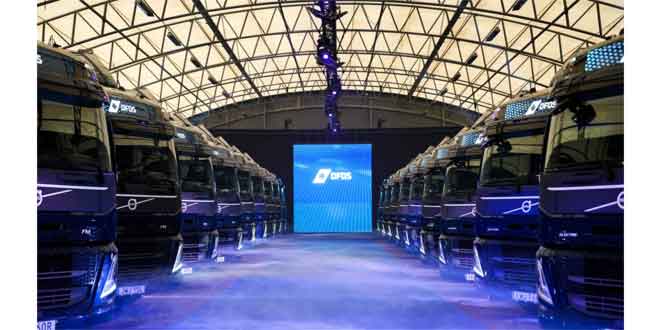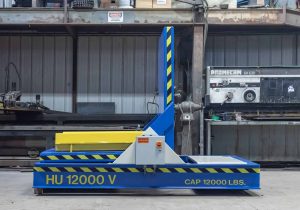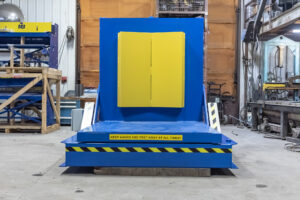Logistics company DFDS has launched a new fleet of 20 electric trucks in Gothenburg. This is the single biggest delivery of heavy electric trucks in the Nordic region. Together with an additional 30 electric trucks that are to be delivered later, the fleet in Gothenburg accounts for a significant proportion of the 125 electric Volvo trucks that DFDS has ordered for roll-out in 2023. The new electric trucks will be based in the DFDS truck depot in Arendal, in the outer area of the Port of Gothenburg.
“These vehicles represent a massive step in the electrification of land-based transport in the port and the surrounding area. From having been a rare occurrence, this will mean that electric trucks will be a common sight in the port area; this is bound to cause ripples and inspire others,” says Edvard Molitor, Head of Sustainability at the Gothenburg Port Authority.
The trucks are the Volvo FM Electric model and can carry a combined total load of 44 tonnes, with a range of up to 380 kilometres. The trucks will be used for short and long-distance assignments in DFDS’s supply chain, to meet the increased demand for sustainable transport operations that DFDS is seeing among its customers.
In 2021, DFDS and Volvo Trucks launched a joint project for sustainable road transport operations, and the road towards achieving carbon dioxide neutrality in 2050 requires continued collaboration with actors in both the industry and society. This is emphasised by Niklas Andersson, Executive Vice President and Head of Logistics Division at DFDS:
“Replacing our conventional diesel trucks with alternatives such as Volvo FM Electric trucks will have a significant impact on our carbon dioxide emissions. But it will take much more than financial investments. The transition requires the right infrastructure and collaboration across different areas of society. It can’t be achieved in isolation.”
For the port’s part, they are working together with terminal operators and customers to support the transition. At sea of course, but the focus on the transition for land-based transport is also a top priority. This includes the construction of charging infrastructure and hydrogen stations at several locations around the port, and terminal operators have introduced priority for electric trucks at the gates most heavily used by trucks.
Extending the green corridor between the Port of Gothenburg and Ghent
DFDS is a key actor at the Port of Gothenburg – both on land and at sea, where the shipping company has 16 departures a week at the ports of Immingham, Zeebrugge and Ghent. The port authorities in Gothenburg and Ghent have collaborated with DFDS to establish a so-called green corridor between the Port of Gothenburg and Ghent.
In concrete terms, the green corridor means that DFDS is planning to modify its current vessels on this route so that they can run on alternative fuels within the next few years. In the next stage, around 2026 and onwards, DFDS aims to start introducing newly constructed vessels that run on ammonia or methanol. As for the ports, they are offering discounts on port tariffs, electrical connections at the quayside and a commitment to secure access to alternative fuels.
“Now that DFDS has introduced electric trucks to serve both Gothenburg and Ghent, the green corridor can be extended on land. This is of course very positive for logistics around the two ports, and it also represents an important contribution to the Port of Gothenburg’s ambitious climate goal to reduce port-related carbon dioxide emissions in the Gothenburg region – both at sea and on land – by 70% by 2030,” says Edvard Molitor.







